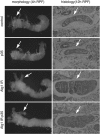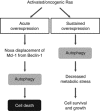Cell death by autophagy: facts and apparent artefacts
- PMID: 22052193
- PMCID: PMC3252836
- DOI: 10.1038/cdd.2011.146
Cell death by autophagy: facts and apparent artefacts
Abstract
Autophagy (the process of self-digestion by a cell through the action of enzymes originating within the lysosome of the same cell) is a catabolic process that is generally used by the cell as a mechanism for quality control and survival under nutrient stress conditions. As autophagy is often induced under conditions of stress that could also lead to cell death, there has been a propagation of the idea that autophagy can act as a cell death mechanism. Although there is growing evidence of cell death by autophagy, this type of cell death, often called autophagic cell death, remains poorly defined and somewhat controversial. Merely the presence of autophagic markers in a cell undergoing death does not necessarily equate to autophagic cell death. Nevertheless, studies involving genetic manipulation of autophagy in physiological settings provide evidence for a direct role of autophagy in specific scenarios. This article endeavours to summarise these physiological studies where autophagy has a clear role in mediating the death process and discusses the potential significance of cell death by autophagy.
Figures




References
-
- Galluzzi L, Vitale I, Abrams JM, Alnemri ES, Baehrecke EH, Blagosklonny MV, et al. Molecular definitions of cell death subroutines: recommendations of the Nomenclature Committee on Cell Death 2012 Cell Death Differ 2011. e-pub ahead of print 15 July 2011; doi:10.1038/cdd.2011.96 - DOI - PMC - PubMed
-
- Kumar S. Caspase function in programmed cell death. Cell Death Differ. 2007;14:32–43. - PubMed
Publication types
MeSH terms
Substances
LinkOut - more resources
Full Text Sources
Molecular Biology Databases
Research Materials

